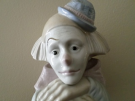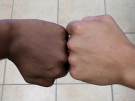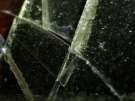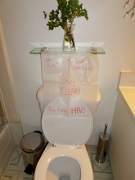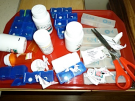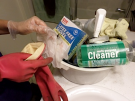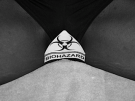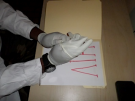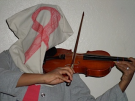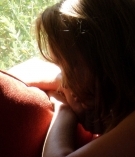HIV & Stigma Photovoice
Participants of this study were trained in PhotoVoice by Pulitzer Prize winning photojournalist Daniel A. Anderson and asked to reflect on their personal experiences with HIV-stigma. They were then given digital cameras and asked to bring those reflections to life using documentary photography. Participants recorded the meaning of each photograph in a contextual journal in preparation for focus group discussions and structured interviews.
The PhotoVoice research study was sponsored by the University of California Global Health Institute (UCGHI) and was a collaboration between University of California Irvine (UC Irvine) and University of Southern California (USC).
Sad clown
"...I can make everyone else happy, but I'm not happy."
The participant who took this photo said that she is an optimistic person by nature, full of humor and zeal for life. However, having HIV and seeing how society judges people who have it, has made her unhappy and she's not sure if she'll ever be happy.
It's a worldwide fight
"...black or white...HIV does not discriminate."
The participant who took this photo said that she finds it upsetting and stigmatizing when she's told that HIV only affects Blacks and Hispanics. She said that HIV does not discriminate and it's a worldwide struggle and therefore the fight must be worldwide.
HIV and broken
"....takes life away."
The participant who took this photo said that when she received her diagnosis, her world shattered into many pieces and this feeling of being broken was exacerbated by how harshly people with HIV are treated. The broken glass is from an antique window and is therefore old, symbolizing outdated perceptions about HIV, how it's transmitted and who contracts it.
Everything stops at the iron gates
"...spider webs represent outdated beliefs about who and how people get HIV."
The participant who took this photo said that she grew up Catholic and her mother always told her to go to God and to go to Church when she had problems. However, the Church shunned her and has continued to shun people with HIV because of outdated beliefs about how HIV is transmitted and who gets HIV. The gates of the church that she photographed were closed and covered with spider webs, symbolizing how the church has behaved since the beginning of the epidemic.
Stop it all
"...stigma, prejudice, stop everything that makes people feel less than humane about themselves."
The participant who took this photo stated that people with HIV are often treated as though they are not human. In order for society to move forward and to contain this epidemic and the stigma that it comes with, all prejudice against those with HIV must stop.
Caged lion
"...always covered by this disease."
The participant who took this photo stated that she has been an advocate since the age of 9. However, this disease has kept her caged. The stigma that it comes with drives her into a dark tunnel, to hide her face so that people don't find out. As a result she is unable to advocate for herself and for others with HIV and this makes her feel like she's not doing what she was put on this Earth to do.
Stay clear of my kids' bathroom
The participant who took this photo stated that her family was the main perpetrator of stigma against her as a result of her HIV diagnosis. Her sister would not allow her to share a bathroom with her children because she feared infection. Even though, the sister was a college graduate and had some knowledge about HIV, she believed that HIV could be transmitted with casual contact and could be suspended in air.
Cutting Labels...
"...every time I finish using all the pills in a bottle, I painstakingly remove these "hard to take off" labels. I don't want someone, anyone knowing I have HIV because of the stigma. Cutting prescription labels is a reminder that I have HIV."
The participant behind this photo stated that removing labels off her HIV meds is out of fear that she will be discovered, that she will be revealed. Since she does not want to risk being ostracized and since she doesn't want people to go through her garbage and find out that she has HIV, she removes labels from pill bottles. The process is very difficult and often results into cracked nails and painful fingers.
A Caretaker came to clean my home
"...and purposely wore two pairs of gloves falsely thinking she could get HIV."
The participant behind this photo stated that a caretaker, who was aware of her HIV status, began to put multiple pairs of gloves on to clean her house because she feared infection and then lied that she wanted to protect her nails. The participant was terribly hurt by this gesture and asked the cleaning person not to return.
My sex drive didn't drive me to HIV
The participant who took this photo stated that people erroneously believe that those infected with HIV have an insatiable sex drive and that's simply not true. HIV doesn't fit a perfect profile.
Contagious
The participant behind this photo has experienced extreme episodes of fear. This fear is of dating, intimacy, and relationships in general. When she disclosed her status, prospective partners made her feel as though she was dirty and not deserving of love. They told her that they would rather have sex with someone who was unclean vs. someone with HIV. A particular man told her that no one in the right mind would want to be intimate with her knowing her status and that there was no point in getting to know her.
Double Up
The participant behind this photo stated that she was once having her blood drawn at a clinic. The phlebotomist was not going to use rubber gloves to do so. The participant asked her why she wasn't, and the phlebotomist said that they only use gloves for certain people. The participant then asked her if by certain people she meant people like her... with HIV. After hearing that the participant had HIV, the phlebotomist rolled her eyes and exited the room. Another phlebotomist came in and used double gloves to draw her blood.
My story is not another sad story
The participant who took this photo said that her story is not another said story worthy of violin playing. It's a story about her life with HIV. She said that HIV is a disease like no other because its stigma causes her to hide, to feel chronically sad and dirty.
My cocktail is not your cocktail
The participant said that her cocktail is not the same cocktail that others enjoy while out and about, mingling, and having fun, and being irresponsible. Her cocktail is her livelihood, it's what keeps her alive, and her cocktail must be taken not just when it’s convenient, but every day.
Isolation
"...loss of life and HIV."
The participant who took this photo stated that her diagnosis and inability to speak to anyone about it because of fear of judgment and discrimination, led her to live a life of extreme isolation. She felt that her HIV diagnosis was the loss of her life.
Study Title: Reducing HIV/AIDS-related Stigma through PhotoVoice: A Road to Policy Change
Principal Investigator: Mariam Davtyan, MPH
Doctoral Student, Program in Public Health
University of California, Irvine
Faculty Advisor: Brandon J. Brown, PhD., MPH. (Program in Public Health, UC Irvine)
mdavtyan@uci.edu


